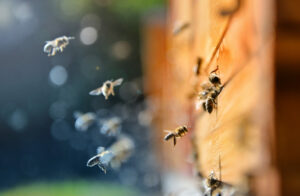Beekeeper Hannah Sjostrom is working on an expansion plan for her family’s third-generation apiary, Honey Hill apiaries, in Maiden Rock, Wisconsin. Her family raises about 200 hives during the summer. In the winter, she sends them across the country to pollinate almonds. When the bees come back to Wisconsin, that’s when the expansion process starts.
“The last couple years have really been spent on making sure we have quality bees, so when we’re sending them out to California, when they come back, the goal is that the hives are going to be so big and healthy, we can split them in half,” she explains. “Our goal for this next year… is to take as many hives as we can and split it into two to three more hives.”
The process of splitting hives for expansion is both an art and a science. Utilizing frames of brood and relocating splits to new yards, Sjostrom orchestrates expansions while ensuring each hive receives adequate resources for growth. Collaborating with southern states for queen bees supplements their expansion strategies.
Sjostrom explains that she only removes excess honey from the hives to sell to consumers. If the bees are not making excess honey, or enough honey for the colony to eat, she supplements their feed with sugar water or corn syrup to keep them healthy.
Despite the bees spending winters in California, Sjostrom’s work continues year-round. Managing sales, preparing products, and planning for the upcoming season keeps her engaged, even during the “off-season.” Interacting with customers at farmer’s markets has also evolved, with more people expressing concern for bee welfare and seeking ways to contribute positively.


